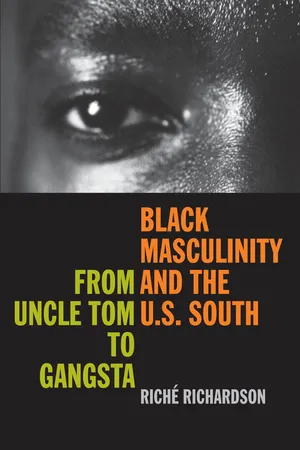
- 304 pages
- English
- PDF
- Available on iOS & Android
About this book
This pathbreaking study of region, race, and gender reveals how we underestimate the South's influence on the formation of black masculinity at the national level. Many negative stereotypes of black men—often contradictory ones—have emerged from the ongoing historical traumas initiated by slavery. Are black men emasculated and submissive or hypersexed and violent? Nostalgic representations of black men have arisen as well: think of the philosophical, hardworking sharecropper or the abiding, upright preacher. To complicate matters, says Riché Richardson, blacks themselves appropriate these images for purposes never intended by their (mostly) white progenitors.
Starting with such well-known caricatures as the Uncle Tom and the black rapist, Richardson investigates a range of pathologies of black masculinity that derive ideological force from their associations with the South. Military policy, black-liberation discourse, and contemporary rap, she argues, are just some of the instruments by which egregious pathologies of black masculinity in southern history have been sustained. Richardson's sources are eclectic and provocative, including Ralph Ellison's fiction, Charles Fuller's plays, Spike Lee's films, Huey Newton's and Malcolm X's political rhetoric, the O. J. Simpson discourse, and the music production of Master P, the Cash Money Millionaires, and other Dirty South rappers.
Filled with new insights into the region's role in producing hierarchies of race and gender in and beyond their African American contexts, this new study points the way toward more epistemological frameworks for southern literature, southern studies, and gender studies.
Frequently asked questions
- Essential is ideal for learners and professionals who enjoy exploring a wide range of subjects. Access the Essential Library with 800,000+ trusted titles and best-sellers across business, personal growth, and the humanities. Includes unlimited reading time and Standard Read Aloud voice.
- Complete: Perfect for advanced learners and researchers needing full, unrestricted access. Unlock 1.4M+ books across hundreds of subjects, including academic and specialized titles. The Complete Plan also includes advanced features like Premium Read Aloud and Research Assistant.
Please note we cannot support devices running on iOS 13 and Android 7 or earlier. Learn more about using the app.
Information

Table of contents
- Contents
- Acknowledgments
- Introduction
- CHAPTER 1 Lessons from Thomas Dixon to The Klansman
- CHAPTER 2 Charles Fuller’s Southern Specter
- CHAPTER 3 Ralph Ellison’s Rural Geography
- CHAPTER 4 Spike Lee’s Uncle Toms and Urban Revolutionaries
- CHAPTER 5 Gangstas and Playas in the Dirty South
- Conclusion
- Notes
- Bibliography
- Index